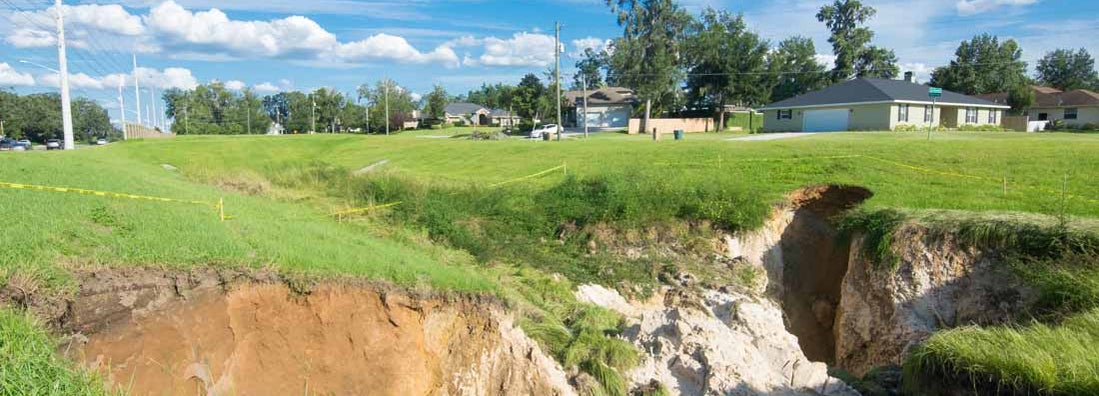Sinkhole Insurance
(About 40% of US Land Is at Risk for Sinkholes)

The U.S. Geological Survey estimates that 35 to 40% of all the land in the U.S. is susceptible to sinkholes. While giant sinkholes often make news, smaller sinkholes are also exceptionally costly to homeowners.
In 2009, the average sinkhole claim cost Florida insurance companies over $86,000 for cracked driveways, walls, and foundations. In that year, insurance companies paid out over $97 million.
People invest significant resources in their homes and vehicles. Mortgage companies require homeowners to protect their assets with suitable home insurance policies, but most do not require the inclusion of sinkhole insurance.
Sinkholes have the potential to destroy homes and property, but because they are relatively rare, most people never consider; how real that threat could be for their family. Sinkholes are unpredictable, but you can protect your property with a sinkhole insurance policy.
Our independent agent matching tool will find you the best insurance solution in your area. Tell us what you're looking for and we'll recommend the best agents for you. Any information you provide will only be sent to the agent you pick.
Sinkholes in America
- Most sinkholes in America occur in Florida
- Pennsylvania has the second-highest rate of sinkholes
- The ability to purchase sinkhole insurance is guaranteed in FL and PA
- The largest sinkhole in the U.S. is the Texas Devil’s Sinkhole in Rocksprings, TX; it has a 50-foot wide opening and drops 350 feet into the ground
What Is a Sinkhole?
Sinkholes are catastrophic phenomena that occur all over the world. They are natural depressions or holes that form in the earth’s crust. Sinkholes can result from both natural and man-made causes.
The occurance of sinkholes can be a dramatic event that swallows up cars, roadways and even homes. Sinkholes can also cause merely minor depressions in the earth’s surface, barely visible but highly destructive.
Some sinkholes happen gradually over time while others are sudden and disastrous. A ground-shift of as little as a couple inches can be enough to severely damage the structure of a home or building, rendering it unsafe for habitation.
What Causes Sinkholes?
Sinkholes can have a variety of underlying causes. Some are natural and some are man-made.
- Natural causes: Sinkholes can be caused by the after-effects of earthquakes, erosions in the earth's surface or the presence of excess groundwater. Although excessive rains and flooding can sometimes cause these disasters, there is evidence that extreme droughts can have the same effect. Natural sinkholes usually show early signs of erosion.
- Man-made causes: Sinkholes can sometimes be precipitated by man-made forces that weaken underlying layers in the earth’s crust. Some common causes include excessive drilling, mining, construction and even lots of heavy traffic. Some suspect that hydraulic fracture mining ("fracking") may have this effect as well. Mine subsidence in abandoned coal mines over which development has occurred can also cause these catastrophes.
What Is Sinkhole Insurance?
Many homeowners and business insurance policies offer special endorsements for sinkhole coverage. Without this additional coverage, sinkhole damage is frequently not covered.
If your home or business is destroyed by a sinkhole and you do not have a sinkhole insurance policy, you will receive no compensation for your losses. This is a financial hit that most families cannot manage.
Cars need coverage, too. You can get coverage for your vehicle simply by including comprehensive coverage with your car or truck insurance policy.
This coverage will provide you with compensation for loss or damage caused by sinkholes as well as other common occurrences such as fire, inclement weather, falling objects and theft.
What Does Sinkhole Insurance Cover?
Sinkhole insurance will provide compensation for damages to your business or home, outlying property and personal belongings kept inside the building if they are damaged as the result of a sinkhole on your property.
Even a small shift in the earth beneath the foundation of a building can cause severe structural damage. A major sinkhole can swallow up the entire building and its contents.
Be certain to carry enough coverage to allow you to completely rebuild if your home or business is completely destroyed. This insurance will also cover necessary preventive measures, such as structural bracing, to keep an impending sinkhole from causing severe damage to your property.
Your sinkhole insurance policy may not provide coverage for damages from mine subsidence, so be sure to review your policy carefully to see if you need additional insurance.
Who Should Consider Sinkhole Insurance?
Some areas are more susceptible to sinkholes that others. These events cause the most damage Florida, Pennsylvania, Texas, Alabama, Missouri, Kentucky and Tennessee. If you live in an area less susceptible to this damage, you may be able to purchase this additional coverage at a very low rate.
Some sinkholes occur as a result of mine subsidence. This is most likely to happen in areas that have been built over old coal mines. Old mines sometimes collapse and cause major depressions in the ground.
In some cases, sinkhole insurance will not cover damages caused by mine subsidence. For that, you will need a mine subsidence insurance policy. These policies are available in most states where mine subsidence is a problem.
How Can I Detect a Sinkhole on My Property?
Many sinkholes develop over time. If you maintain your property and keep your eye out for changes in the ground, you'll have the best chances of avoiding damage. Those who live in sinkhole-prone areas should be constantly on the lookout for signs of shifting earth. Things to look for include:
- Cracks developing around windows or doors
- Windows and doors that are becoming progressively more difficult to open and close
- Depressions in your yard or in areas surrounding your home
- Deep cracks in outdoor walkways, driveways or the street near your home
- Unusual sediment in your drinking water
If you suspect that there may be sinkhole activity developing, contact your insurance company. They will send someone out to investigate and will advise you on actions that can be taken to secure your property.
Where Can I Learn More About Sinkholes?
If you're concerned there could be a sinkhole on your property or nearby, your local government can help you learn more. Most states have websites for the local DNR that can help you get information about the land in your area.
When in doubt - call the professionals. Especially if you live in a state where sinkholes are common, there are likely sinkhole repair and remediation specialists that are just an online search away.
If you need insurance coverage for sinkholes, you can search online for insurance providers, or call around to local agencies. Just make sure you're choosing a highly rated independent agent and that you're comparing a few quotes before you buy.
